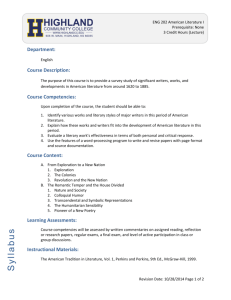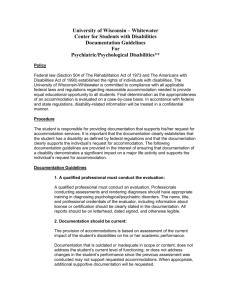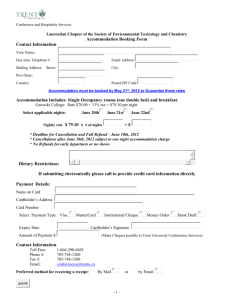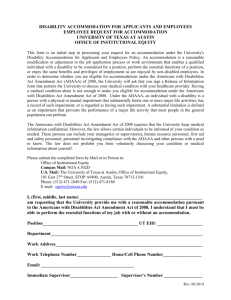28 C.F.R. Part 36 Subpart A -- General §36.101 Purpose. The
advertisement
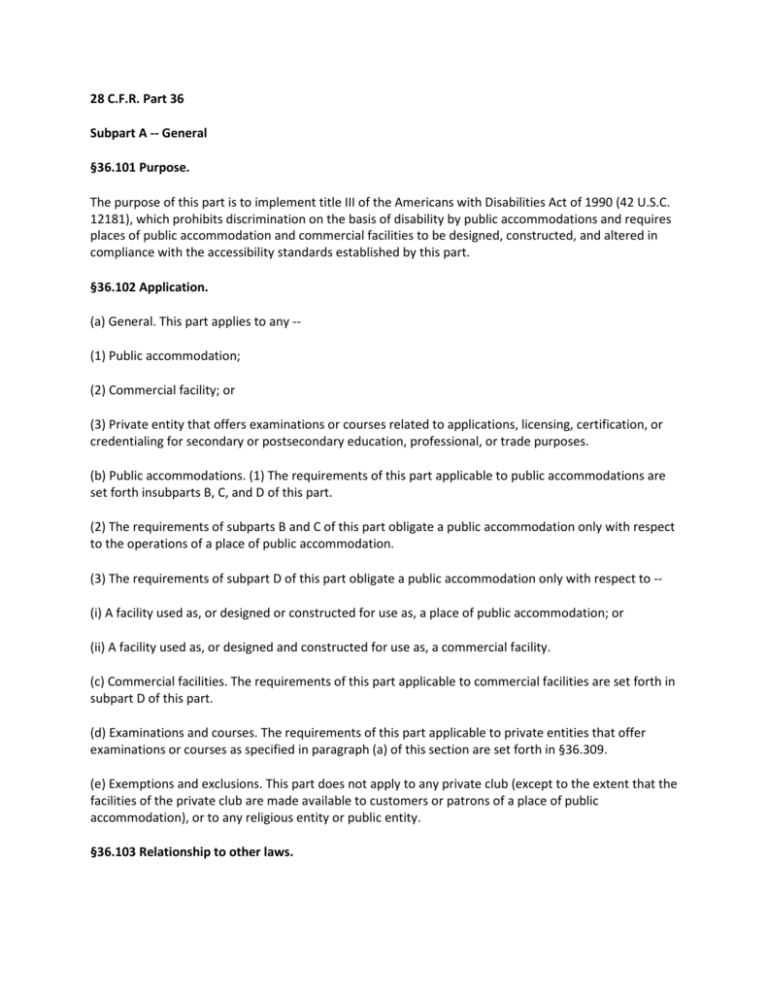
28 C.F.R. Part 36 Subpart A -- General §36.101 Purpose. The purpose of this part is to implement title III of the Americans with Disabilities Act of 1990 (42 U.S.C. 12181), which prohibits discrimination on the basis of disability by public accommodations and requires places of public accommodation and commercial facilities to be designed, constructed, and altered in compliance with the accessibility standards established by this part. §36.102 Application. (a) General. This part applies to any -(1) Public accommodation; (2) Commercial facility; or (3) Private entity that offers examinations or courses related to applications, licensing, certification, or credentialing for secondary or postsecondary education, professional, or trade purposes. (b) Public accommodations. (1) The requirements of this part applicable to public accommodations are set forth insubparts B, C, and D of this part. (2) The requirements of subparts B and C of this part obligate a public accommodation only with respect to the operations of a place of public accommodation. (3) The requirements of subpart D of this part obligate a public accommodation only with respect to -(i) A facility used as, or designed or constructed for use as, a place of public accommodation; or (ii) A facility used as, or designed and constructed for use as, a commercial facility. (c) Commercial facilities. The requirements of this part applicable to commercial facilities are set forth in subpart D of this part. (d) Examinations and courses. The requirements of this part applicable to private entities that offer examinations or courses as specified in paragraph (a) of this section are set forth in §36.309. (e) Exemptions and exclusions. This part does not apply to any private club (except to the extent that the facilities of the private club are made available to customers or patrons of a place of public accommodation), or to any religious entity or public entity. §36.103 Relationship to other laws. (a) Rule of interpretation. Except as otherwise provided in this part, this part shall not be construed to apply a lesser standard than the standards applied under title V of the Rehabilitation Act of 1973 (29 U.S.C. 791) or the regulations issued by Federal agencies pursuant to that title. (b) Section 504. This part does not affect theobligations of a recipient of Federal financial assistance to comply with the requirements of section 504 of the Rehabilitation Act of 1973 (29 U.S.C. 794) and regulations issued by Federal agencies implementing section 504. (c) Other laws. This part does not invalidate or limit the remedies, rights, and procedures of any other Federal laws, or State or local laws (including State common law) that provide greater or equal protection for the rights of individuals with disabilities or individuals associated with them. §36.104 Definitions. For purposes of this part, the term -Act means the Americans with Disabilities Act of 1990 (Pub. L. 101 - 336, 104 Stat. 327, 42 U.S.C. 12101 12213 and 47 U.S.C. 225 and 611). Commerce means travel, trade, traffic, commerce, transportation, or communication -(1) Among the several States; (2) Between any foreign country or any territory or possession and any State; or (3) Between points in the same State but through another State or foreign country. Commercial facilities means facilities -(1) Whose operations will affect commerce; (2) That are intended for nonresidential use by a private entity; and (3) That are not -(i) Facilities that are covered or expressly exempted from coverage under the Fair Housing Act of 1968, as amended (42 U.S.C. 3601 - 3631); (ii) Aircraft; or (iii) Railroad locomotives, railroad freight cars, railroad cabooses, commuter or intercity passenger rail cars (including coaches, dining cars, sleeping cars, lounge cars, and food service cars), any other railroad cars described in section 242 of the Act or covered under title II of the Act, or railroad rights-of-way. For purposes of this definition, "rail'' and "railroad'' have the meaning given the term "railroad'' in section 202(e) of the Federal Railroad Safety Act of 1970 (45 U.S.C. 431(e)). Current illegal use of drugs means illegal use of drugs that occurred recently enough to justify a reasonable belief that a person's drug use is current or that continuing use is a real and ongoing problem. Disability means, with respect to an individual, a physical or mental impairment that substantially limits one or more of the major life activities of such individual; a record of such an impairment; or being regarded as having such animpairment. (1) The phrase physical or mental impairment means -(i) Any physiological disorder or condition, cosmetic disfigurement, or anatomical loss affecting one or more of the following body systems: neurological; musculoskeletal; special sense organs; respiratory, including speech organs; cardiovascular; reproductive; digestive; genitourinary; hemic and lymphatic; skin; and endocrine; (ii) Any mental or psychological disorder such as mental retardation, organic brain syndrome, emotional or mental illness, and specific learning disabilities; (iii) The phrase physical or mental impairment includes, but is not limited to, such contagious and noncontagious diseases and conditions as orthopedic, visual, speech, and hearing impairments, cerebral palsy, epilepsy, muscular dystrophy, multiple sclerosis, cancer, heart disease, diabetes, mental retardation, emotional illness, specific learning disabilities, HIV disease (whether symptomatic or asymptomatic), tuberculosis, drug addiction, and alcoholism; (iv) The phrase physical or mental impairment does not include homosexuality or bisexuality. (2) The phrase major life activities means functions such as caring for one's self, performing manual tasks, walking, seeing, hearing, speaking, breathing, learning, and working. (3) The phrase has a record of such an impairment means has a history of, or has been misclassified as having, a mental or physical impairment that substantially limits one or more major life activities. (4) The phrase is regarded as having an impairment means -(i) Has a physical or mental impairment that does not substantially limit major life activities but that is treated by a private entity as constituting such a limitation; (ii) Has a physical or mental impairment that substantially limits major life activities only as a result of the attitudes of others toward such impairment; or (iii) Has none of the impairments defined in paragraph (1) of this definition but is treated by a private entity as having such an impairment. (5) The term disability does not include -(i) Transvestism, transsexualism, pedophilia, exhibitionism, voyeurism, gender identity disorders not resulting from physical impairments, or other sexual behavior disorders; (ii) Compulsive gambling, kleptomania, or pyromania; or (iii) Psychoactive substance use disorders resulting from current illegal use of drugs. Drug means a controlled substance, as defined in schedules I through V of section 202 of the Controlled Substances Act (21 U.S.C. 812). Facility means all or any portion of buildings, structures, sites, complexes, equipment, rolling stock or other conveyances, roads, walks, passageways, parking lots, or other real or personal property, including the site where the building, property, structure, or equipment is located. Illegal use of drugs means the use of one or more drugs, the possession or distribution of which is unlawful under the Controlled Substances Act (21 U.S.C. 812). The term "illegal use of drugs'' does not include the use of a drug taken under supervision by a licensed health care professional, or other uses authorized by the Controlled Substances Act or other provisions of Federal law. Individual with a disability means a person who has a disability. The term "individual with a disability'' does not include an individual who is currently engaging in the illegal use of drugs, when the private entity acts on the basis of such use. Place of public accommodation means a facility, operated by a private entity, whose operations affect commerce and fall within at least one of the following categories -(1) An inn, hotel, motel, or other place of lodging, except for an establishment located within a building that contains not more than five rooms for rent or hire and that is actually occupied by the proprietor of the establishment as the residence of the proprietor; (2) A restaurant, bar, or other establishment serving food or drink; (3) A motion picture house, theater, concert hall, stadium, or other place of exhibition or entertainment; (4) An auditorium, convention center, lecture hall, or other place of public gathering; (5) A bakery, grocery store, clothing store, hardware store, shopping center, or other sales or rental establishment; (6) A laundromat, dry-cleaner, bank, barber shop, beauty shop, travel service, shoe repair service, funeral parlor, gas station, office of an accountant or lawyer, pharmacy, insurance office, professional office of a health care provider, hospital, or other service establishment; (7) A terminal, depot, or other station used forspecified public transportation; (8) A museum, library, gallery, or other place of public display or collection; (9) A park, zoo, amusement park, or other place of recreation; (10) A nursery, elementary, secondary, undergraduate, or postgraduate private school, or other place of education; (11) A day care center, senior citizen center, homeless shelter, food bank, adoption agency, or other social service center establishment; and (12) A gymnasium, health spa, bowling alley, golf course, or other place of exercise or recreation. Private club means a private club or establishment exempted from coverage under title II of the Civil Rights Act of 1964 (42 U.S.C. 2000a(e)). Private entity means a person or entity other than a public entity. Public accommodation means a private entity that owns, leases (or leases to), or operates a place of public accommodation. Public entity means -(1) Any State or local government; (2) Any department, agency, special purpose district, or other instrumentality of a State or States or local government; and (3) The National Railroad Passenger Corporation, and any commuter authority (as defined in section 103(8) of the Rail Passenger Service Act). (45 U.S.C. 541) Qualified interpreter means an interpreter who is able to interpret effectively, accurately and impartially both receptively and expressively, using any necessary specialized vocabulary. Readily achievable means easily accomplishable and able to be carried out without much difficulty or expense. In determining whether an action is readily achievable factors to be considered include -(1) The nature and cost of the action needed under this part; (2) The overall financial resources of the site or sites involved in the action; the number of persons employed at the site; the effect on expenses and resources; legitimate safety requirements that are necessary for safe operation, including crime prevention measures; or the impact otherwise of the action upon the operation of the site; (3) The geographic separateness, and the administrative or fiscal relationship of the site or sites in question to any parent corporation or entity; (4) If applicable, the overall financial resources of any parent corporation or entity; the overall size of the parent corporation or entity with respect to the number of its employees; the number, type, and location of its facilities; and (5) If applicable, the type of operation or operations of any parent corporation or entity, including the composition, structure, and functions of the workforce of the parent corporation or entity. Religious entity means a religious organization, including a place of worship. Service animal means any guide dog, signal dog, or other animal individually trained to do work or perform tasks for the benefit of an individual with a disability, including, but not limited to, guiding individuals with impaired vision, alerting individuals with impaired hearing to intruders or sounds, providing minimal protection or rescue work, pulling awheelchair, or fetching dropped items. Specified public transportation means transportation by bus, rail, or any other conveyance (other than by aircraft) that provides the general public with general or special service (including charter service) on a regular and continuing basis. State means each of the several States, the District of Columbia, the Commonwealth of Puerto Rico, Guam, American Samoa, the Virgin Islands, the Trust Territory of the Pacific Islands, and the Commonwealth of the Northern Mariana Islands. Undue burden means significant difficulty or expense. In determining whether an action would result in an undue burden, factors to be considered include -(1) The nature and cost of the action needed under this part; (2) The overall financial resources of the site or sites involved in the action; the number of persons employed at the site; the effect on expenses and resources; legitimate safety requirements that are necessary for safe operation, including crime prevention measures; or the impact otherwise of the action upon the operation of the site; (3) The geographic separateness, and the administrative or fiscal relationship of the site or sites in question to any parent corporation or entity; (4) If applicable, the overall financial resources of any parent corporation or entity; the overall size of the parent corporation or entity with respect to the number of its employees; the number, type, and location of its facilities; and (5) If applicable, the type of operation or operations of any parent corporation or entity, including the composition, structure, and functions of the workforce of the parent corporation or entity. §.36.105 -- 36.199 [Reserved] Subpart B -- General Requirements §36.201 General. (a) Prohibition of discrimination. No individual shall be discriminated against on the basis of disability in the full and equal enjoyment of the goods, services, facilities, privileges, advantages, or accommodations of any place of public accommodation by any private entity who owns, leases (or leases to), or operates a place of public accommodation. (b) Landlord and tenant responsibilities. Both the landlord who owns the building that houses a place of public accommodation and the tenant who owns or operates the place of public accommodation are public accommodations subject to the requirements of this part. As between the parties, allocation of responsibility for complying with the obligations of this part may be determined by lease or other contract. §36.202 Activities. (a) Denial of participation. A public accommodation shall not subject an individual or class of individuals on the basis of a disability or disabilities of such individual or class, directly, or through contractual, licensing, or other arrangements, to a denial of the opportunity of the individual or class to participate in or benefit from the goods, services, facilities, privileges, advantages, or accommodations of a place of public accommodation. (b) Participation in unequal benefit. A public accommodation shall not afford an individual or class of individuals, on the basis of a disability or disabilities of such individual or class, directly, or through contractual, licensing, or other arrangements, with the opportunity to participate in or benefit from a good, service, facility, privilege, advantage, or accommodation that is not equal to that afforded to other individuals. (c) Separate benefit. A public accommodation shall not provide an individual or class of individuals, on the basis of a disability or disabilities of such individual or class, directly, or through contractual, licensing, or other arrangements with a good, service, facility, privilege, advantage, or accommodation that is different or separate from that provided to other individuals, unless such action is necessary to provide the individual or class of individuals with a good, service, facility, privilege, advantage, or accommodation, or other opportunity that is as effective as that provided to others. (d) Individual or class of individuals. For purposes of paragraphs (a) through (c) of this section, the term "individual or class of individuals'' refers to the clients or customers of the public accommodation that enters into the contractual, licensing, or other arrangement. §36.203 Integrated settings. (a) General. A public accommodation shall afford goods, services, facilities, privileges, advantages, and accommodations to an individual with a disability in the most integrated setting appropriate to the needs of the individual. (b) Opportunity to participate. Notwithstanding the existence of separate or different programs or activities provided in accordance with this subpart, a public accommodation shall not deny an individual with a disability an opportunity to participate in such programs or activities that are not separate or different. (c) Accommodations and services. (1) Nothing in this part shall be construed to require an individual with a disability to accept an accommodation, aid, service, opportunity, or benefit available under this part that such individual chooses not to accept. (2) Nothing in the Act or this part authorizes there presentative or guardian of an individual with a disability to decline food, water, medical treatment, or medical services for that individual. §36.204 Administrative methods. A public accommodation shall not, directly or through contractual or other arrangements, utilize standards or criteria or methods of administration that have the effect of discriminating on the basis of disability, or that perpetuate the discrimination of others who are subject to common administrative control. §36.205 Association. A public accommodation shall not exclude or otherwise deny equal goods, services, facilities, privileges, advantages, accommodations, or other opportunities to an individual or entity because of the known disability of an individual with whom the individual or entity is known to have a relationship or association. §36.206 Retaliation or coercion. (a) No private or public entity shall discriminate against any individual because that individual has opposed any act or practice made unlawful by this part, or because that individual made a charge, testified, assisted, or participated in any manner in an investigation, proceeding, or hearing under the Act or this part. (b) No private or public entity shall coerce, intimidate, threaten, or interfere with any individual in the exercise or enjoyment of, or on account of his or her having exercised or enjoyed, or on account of his or her having aided or encouraged any other individual in the exercise or enjoyment of, any right granted or protected by the Act or this part. (c) Illustrations of conduct prohibited by this section include, but are not limited to: (1) Coercing an individual to deny or limit the benefits, services, or advantages to which he or she is entitled under the Act or this part; (2) Threatening, intimidating, or interfering with an individual with a disability who is seeking to obtain or use the goods, services, facilities, privileges, advantages, or accommodations of a public accommodation; (3) Intimidating or threatening any person because that person is assisting or encouraging an individual or group entitled to claim the rights granted or protected by the Act or this part to exercise those rights; or (4) Retaliating against any person because that person has participated in any investigation or action to enforce the Act or this part. §36.207 Places of public accommodation located in private residences. (a) When a place of public accommodation is located in a private residence, the portion of the residence used exclusively as a residence is not covered by this part, but that portion used exclusively in the operation of the place of public accommodation or that portion used both for the place of public accommodation and for residential purposes is covered by this part. (b) The portion of the residence covered under paragraph (a) of this section extends to those elements used to enter the place of public accommodation, including the homeowner's front sidewalk, if any, the door or entryway, and hallways; and those portions of the residence, interior or exterior, available to or used by customers or clients, including restrooms. §36.208 Direct threat. (a) This part does not require a public accommodation to permit an individual to participate in or benefit from the goods, services, facilities, privileges, advantages and accommodations of that public accommodation when that individual poses a direct threat to the health or safety of others. (b) Direct threat means a significant risk to the health or safety of others that cannot be eliminated by a modification of policies, practices, or procedures, or by the provision of auxiliary aids or services. (c) In determining whether an individual poses a direct threat to the health or safety of others, a public accommodation must make an individualized assessment, based on reasonable judgment that relies on current medical knowledge or on the best available objective evidence, to ascertain: the nature, duration, and severity of the risk; the probability that the potential injury will actually occur; and whether reasonable modifications of policies, practices, or procedures will mitigate the risk. §36.209 Illegal use of drugs. (a) General. (1) Except as provided in paragraph (b) of this section, this part does not prohibit discrimination against an individual based on that individual's current illegal use of drugs. (2) A public accommodation shall not discriminate on the basis of illegal use of drugs against an individual who is not engaging in current illegal use of drugs and who -(i) Has successfully completed a supervised drug rehabilitation program or has otherwise been rehabilitated successfully; (ii) Is participating in a supervised rehabilitation program; or (iii) Is erroneously regarded as engaging in such use. (b) Health and drug rehabilitation services. (1) A public accommodation shall not deny health services, or services provided in connection with drug rehabilitation, to an individual on the basis of that individual's current illegal use of drugs, if the individual is otherwise entitled to such services. (2) A drug rehabilitation or treatment program may deny participation to individuals who engage in illegal use of drugs while they are in the program. (c) Drug testing. (1) This part does not prohibit a public accommodation from adopting or administering reasonable policies or procedures, including but not limited to drug testing, designed to ensure that an individual who formerly engaged in the illegal use of drugs is not now engaging incurrent illegal use of drugs. (2) Nothing in this paragraph (c) shall be construed to encourage, prohibit, restrict, or authorize the conducting of testing for the illegal use of drugs. §36.210 Smoking. This part does not preclude the prohibition of, or the imposition of restrictions on, smoking in places of public accommodation. §36.211 Maintenance of accessible features. (a) A public accommodation shall maintain in operable working condition those features of facilities and equipment that are required to be readily accessible to and usable by persons with disabilities by the Act or this part. (b) This section does not prohibit isolated or temporary interruptions in service or access due to maintenance or repairs. §36.212 Insurance. (a) This part shall not be construed to prohibit or restrict -(1) An insurer, hospital or medical service company, health maintenance organization, or any agent, or entity that administers benefit plans, or similar organizations from underwriting risks, classifying risks, or administering such risks that are based on or not inconsistent with State law; or (2) A person or organization covered by this part from establishing, sponsoring, observing or administering the terms of a bona fide benefit plan that are based on underwriting risks, classifying risks, or administering such risks that are based on or not inconsistent with State law; or (3) A person or organization covered by this part from establishing, sponsoring, observing or administering the terms of a bona fide benefit plan that is not subject to State laws that regulate insurance. (b) Paragraphs (a) (1), (2), and (3) of this section shall not be used as a subterfuge to evade the purposes of the Act or this part. (c) A public accommodation shall not refuse to serve an individual with a disability because its insurance company conditions coverage or rates on the absence of individuals with disabilities. §36.213 Relationship of subpart B to subparts C and D of this part. Subpart B of this part sets forth the general principles of nondiscrimination applicable to all entities subject to this part. Subparts C and D of this part provide guidance on the application of the statute to specific situations. The specific provisions, including the limitations on those provisions, control over the general provisions in circumstances where both specific and general provisions apply.

